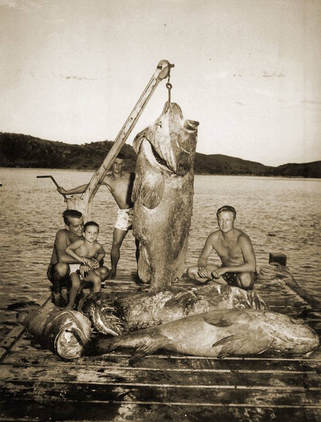ReefSYN - Reef Synthesis Working Group
Project: Brazilian reefs in the Anthropocene
Project: Brazilian reefs in the Anthropocene
The project “Brazilian reef systems in the Anthropocene: estimating the impacts of biodiversity loss on marine ecosystem functioning and services to improve future management and livelihood” is part of the Synthesis Center on Biodiversity and Ecosystem Services (SinBiose), the first ecological synthesis center in Brazil, funded by CNPq. The working group includes 19 researchers from different areas of expertise and Brazilian institutions, as well as managers, masters and PhD students. In this project we will unify extensive datasets collected systematically for reef organisms (fish and benthos) across varying spatial and temporal scales along the Brazilian coast and oceanic islands. The project aims to (i) deliver an integrative synthesis about the distribution of reef biodiversity and the ecosystem services they provide along the Brazilian coast, (ii) model the responses and future trajectories of Brazilian reef communities to global change (e.g. rising SST), (iii) assess the effectiveness of the Brazilian network Marine Protected Areas (MPAs) in safeguarding and offering services to local human populations. P.I. Mariana Bender; Co-P.I. Sergio Floeter; Post-docs. André Luza and Linda Eggertsen.
For more information, visit the ReefSYN website and Instagram.
For more information, visit the ReefSYN website and Instagram.
Functional macroecology of reef fishes
In recent years, ecology has moved from a taxonomic to a trait-based approach in the research of biological communities. Such change has been driven by the importance of improving our knowledge on communities and their susceptibility to global changes, going beyond species lists. Furthermore, traits are related to organisms' function, therefore being a more likely link with ecosystem functioning when compared to taxonomic entities per se. Thus, a functional approach is more appropriate to predict the consequences of species loss to communities' and ecosystem functioning. In this research project, we are investigating several questions related to the functional structure of reef fish communities, most questions being tackled at large spatial scales. Among our project objectives, are: (i) describing the patterns and processes that have driven the extant functional structure of reef fish assemblages across marine biogeographic regions, (ii) describing general rules of assembly to both taxonomic and functional structure of such communities, (iii) investigating patterns of vulnerability and redundancy of fish functions in reefs across spatial scales. We hope to improve the knowledge on the macroecology of reef fishes using a functional approach, contributing to current conservation issues.
Shifting baselines in Brazilian fisheries
Fisheries are in decline at a global scale, and the oceans have been altered by human impact for longer than we can imagine. Our shifted perception of the marine environment and the conservation status of its natural resources characterize what researchers identified as the shifting baseline syndrome. Brazilian fisheries are in decline as elsewhere, but the real impact and changes to marine biodiversity along the vast Brazilian coast are not fully known. In this project, we will investigate the historial changes that the marine life along our coast has been submitted to, mainly focusing on reef fishes. We will gather multiple sources of information to build the most accurate scenario of our ocean's past: interviews with traditional fishermen, fisheries landing data, underwater visual census, naturalist observations, old photographs, maps, art. For more info on the shifting baseline syndrome and changes to Brazilian fisheries, see PUBLICATIONS.




